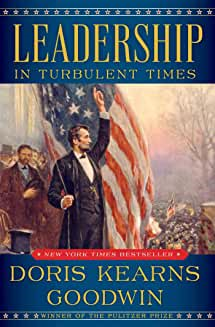
Resident Eleanor Lewis will review Leadership: In Turbulent Times by Doris Kearns Goodwin on Tuesday, October 15, 2019 at 7 PM in the Auditorium.
Leadership: In Turbulent Times gives a revealing picture of its four subjects, all of them involved in politics long before they became President of the United States. The author, in her aim to show the kindred traits that each one exhibited in exercising the directorship of the nation, goes at it in a threefold way: she looks first at the early life of the man (they were, of course, all males) and his development of character: then at any adversity which he had to overcome to achieve his ambitions; finally, how he exercised his talents while in office.
All four confronted “great necessities”, as she puts it: “Abraham Lincoln entered the presidency at the gravest moment of dissolution in American history. Franklin Roosevelt encountered a decisive crisis in our country’s economic survival and the viability of democracy itself. Though neither Theodore Roosevelt nor Lyndon Johnson faced a national crisis on the scale of secession or devastating economic depression, they both assumed office as a result of an assassination, a violent rupture of the democratic mode of succession at a time when seismic tremors had begun to rattle the social order.” The author demonstrates how each was the right person to lead at the moment of history that gave him the reins of government.
Goodwin includes details that give us surprising insights into her subjects. For example, while we are familiar with the close relationship of FDR with his mother, experiences in his early years with his father were life shaping for him, as she demonstrates in describing Franklin’s recuperation from polio.
Likewise, we learn about the influence of LBJ’s parents on their son’s political development. From his mother, a college educated cultured woman with literary aspirations, he learned the value of a good education and an orderly life. From his father, who liked nothing better than swapping stories with his cronies, he received his life-long ability to relate to everyone he met and to manipulate people for his own ambitions. But the tension between his parents gave Lyndon a sense of insecurity and a need to control as well as an enormous desire to please, characteristics which would later show themselves in behavior with subordinates, colleagues and the press.
Goodwin gives a meticulous and fair accounting of each of her subjects, so much so that one might someday take on the task of reading her biography of each of them! But for now, this volume is recommended as noteworthy for its ease in reading and its appropriateness in these, our own times of turbulence.
Janet Neer and Jane Backstrom, Book Review Co-chairs
